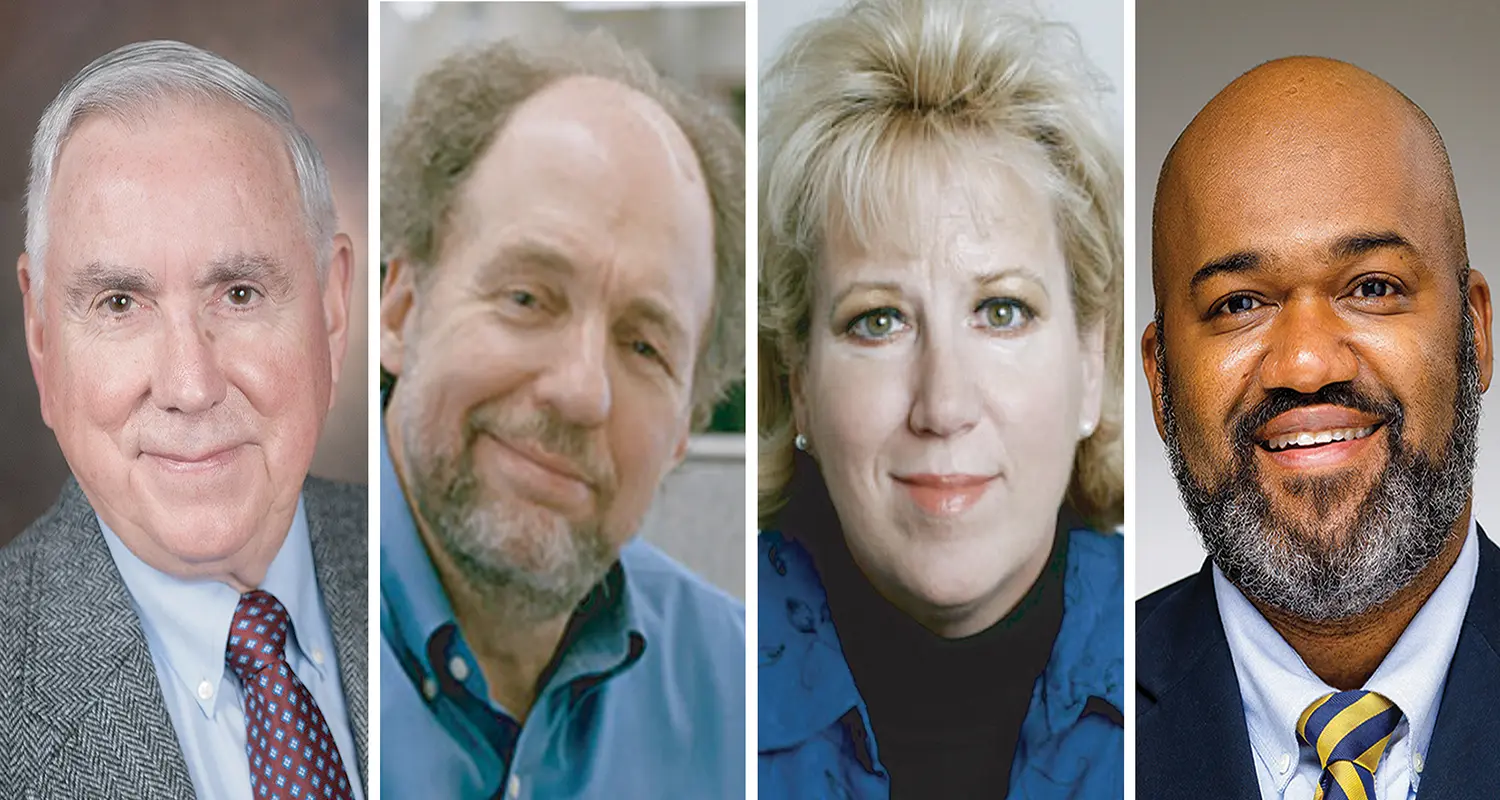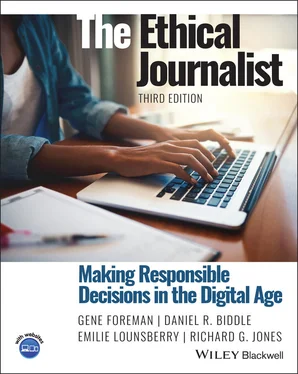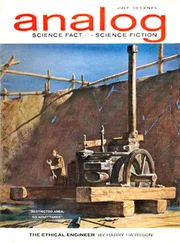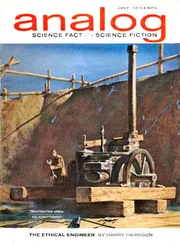Gene Foreman - The Ethical Journalist
Здесь есть возможность читать онлайн «Gene Foreman - The Ethical Journalist» — ознакомительный отрывок электронной книги совершенно бесплатно, а после прочтения отрывка купить полную версию. В некоторых случаях можно слушать аудио, скачать через торрент в формате fb2 и присутствует краткое содержание. Жанр: unrecognised, на английском языке. Описание произведения, (предисловие) а так же отзывы посетителей доступны на портале библиотеки ЛибКат.
- Название:The Ethical Journalist
- Автор:
- Жанр:
- Год:неизвестен
- ISBN:нет данных
- Рейтинг книги:5 / 5. Голосов: 1
-
Избранное:Добавить в избранное
- Отзывы:
-
Ваша оценка:
- 100
- 1
- 2
- 3
- 4
- 5
The Ethical Journalist: краткое содержание, описание и аннотация
Предлагаем к чтению аннотацию, описание, краткое содержание или предисловие (зависит от того, что написал сам автор книги «The Ethical Journalist»). Если вы не нашли необходимую информацию о книге — напишите в комментариях, мы постараемся отыскать её.
Praise for the Third Edition of The Ethical Journalist
ANN MARIE LIPINSKI,
Praise for the Earlier Editions
GENE ROBERTS,
ALICIA C. SHEPARD, The Ethical Journalist
The Ethical Journalist
The Ethical Journalist — читать онлайн ознакомительный отрывок
Ниже представлен текст книги, разбитый по страницам. Система сохранения места последней прочитанной страницы, позволяет с удобством читать онлайн бесплатно книгу «The Ethical Journalist», без необходимости каждый раз заново искать на чём Вы остановились. Поставьте закладку, и сможете в любой момент перейти на страницу, на которой закончили чтение.
Интервал:
Закладка:
The book reflects the coauthors’ experience in the practice of journalism. It is important to note, however, that we have also been influenced by ethics scholars. We have benefited from the scholars’ thoughtful analysis of issues whose nuances we practicing journalists sometimes overlooked as we focused on the next deadline.
To learn journalistic techniques like writing headlines for a website, we presume that you will take other courses and read other textbooks. In contrast, the purpose of this book is to encourage you to ponder the ethics ramifications of what journalists do, whether the consumer gets the news from a computer or a mobile device or a newspaper or a TV or a radio.
The case studies and other actual experiences of journalists recounted in this book illustrate ethics choices you may have to make. In selecting the case studies, we applied an essential yardstick: whether the case illustrates an ethics issue that might be encountered by a journalist in the digital age. The cases reflect episodes that occurred on all news platforms – digital, broadcast, and print. Most of them occurred in recent years, but a few were earlier. For today’s journalists, all of them are pertinent.
The journalists’ decisions in the book’s examples are open to debate, which is precisely why you should study them. If you decide that the journalists involved in case studies made a mistake, bear in mind that, nearly always, those were mistakes of the head and not of the heart. In many ways, learning journalism ethics is about learning from our mistakes.
Our online resources
This book is accompanied by two websites that allow readers to continue to explore issues in journalism ethics.
For instructors who are using the book in their courses, there is a password-protected Instructor Companion Site offering sample slideshow presentations, quiz templates, and other materials for use in the classroom. This site can be reached by visiting www.wiley.com/go/foreman/theethicaljournalist3e.
For all users of the book, the authors have created an Online Forum featuring news updates, videos, supplemental readings, and a comments section for continued discussion. The Online Forum can be accessed at theethicaljournalist.com. The forum is regularly updated by the authors; it is not managed by Wiley-Blackwell, nor is its content published, pre-screened, or pre-approved by the publishing company.
Gene Foreman April 2022
About the Coauthors

Gene Foreman Daniel R. Biddle Emilie Lounsberry Richard G. Jones
Gene Foremanwas the managing editor of three newspapers in a 41-year career, of which the last 25 years (1973–98) were devoted to managing newsroom operations of The Philadelphia Inquirer . He previously was managing editor of the Pine Bluff (Arkansas) Commercial (1963–68) and the Arkansas Democrat (1968–71). After retiring from The Inquirer , Foreman was the inaugural Larry and Ellen Foster Professor at Pennsylvania State University (1998–2006). He received two awards for teaching excellence and was the first winner, in 2013, of the Douglas Anderson Contributor Award for contributions to the College of Communications. In 1997 he received a lifetime achievement award from the Philadelphia chapter of the Society of Professional Journalists; in 2017 he received the Benjamin Franklin Award for excellence from the Pennsylvania NewsMedia Association; and in 2020 he received the Larry Foster Award for Integrity in Public Communication from the Arthur W. Page Center. He is a 1956 journalism graduate of Arkansas State University.
Daniel R. Biddlewrote investigative stories for The Philadelphia Inquirer in 1986 that won a Pulitzer Prize. With two other reporters, he produced the series “Disorder in the Court,” which revealed transgressions of justice in the Philadelphia court system and led to federal and state investigations. As an editor he oversaw investigative reporters and guided Inquirer coverage of three presidential races. Before joining The Inquirer , he reported for The Plain Dealer of Cleveland. He has a bachelor’s degree in history from the University of Michigan and was a Nieman Fellow at Harvard University. He is a coauthor of a book on civil rights history: Tasting Freedom: Octavius Catto and the Battle for Equality in Civil War America (Philadelphia: Temple University Press, 2010). He teaches journalism at the University of Pennsylvania.
Emilie Lounsberrywas a staff writer at The Philadelphia Inquirer from 1982 to 2009, and for much of that time she covered trials and wrote about the law, examining a range of issues from a regional and national perspective. Before joining The Inquirer , she worked at The Bulletin in Philadelphia. She has a bachelor’s degree from Temple University and a master’s from the Columbia University Graduate School of Journalism, which she attended as a Knight-Bagehot Fellow. She also attended a semester at the University of Pennsylvania as a Richard Burke Fellow. She received the National Association of Black Journalists’ Excellence Award in 2018 and an American Judicature Society’s Toni House Journalism Award in 2013 for “outstanding reporting that enhances public understanding of the courts.” Since 2009, she has been an associate professor in the Department of Journalism and Professional Writing at The College of New Jersey. Earlier, she taught a semester at Princeton University as the Ferris Professor of Journalism.
Richard G. Jonesis managing editor for Opinion at The Philadelphia Inquirer and was, most recently, the Walter H. Annenberg-Edmund P. Joyce Director of the John W. Gallivan Program in Journalism, Ethics, and Democracy at the University of Notre Dame. Earlier, in eight years at The Inquirer , he wrote a daily column and was a national correspondent based in Atlanta. Moving to The New York Times , he was a reporter and later associate editor. He led The Times’s newsroom summer internship program and a two-week professional development program for collegiate members of the National Association of Black Journalists and the National Association of Hispanic Journalists. He was twice a winner of the Times Publisher’s Award. He is a graduate of the University of Delaware, where he was editor of the student newspaper. He holds a master’s degree from Columbia University’s Graduate School of Journalism, which he attended as a Knight-Bagehot Fellow. He has advanced to Ph.D. candidacy in journalism studies at the University of Maryland, where he is a Scripps-Howard Doctoral Fellow.
Acknowledgments
We the coauthors are grateful to friends and fellow journalists who contributed their expertise to help us create, in this Third Edition of The Ethical Journalist , a comprehensive examination of journalism ethics in the digital age.
We offer our thanks to the Arthur W. Page Center for Integrity in Public Communication, whose generous grant supported the research, writing, and production of the Third Edition. Established in 2004 at what is now the Donald P. Bellisario College of Communications at Pennsylvania State University, the Page Center is dedicated to the study and advancement of ethics in all forms of public communication. Denise Bortree, the Page Center’s director, took a personal interest in our project and offered encouragement as work progressed.
We thank Charles Knittle, retired copy chief at The New York Times , for his tireless work as editor, fact-checker, proofreader, and counselor in guiding the manuscript into print. We are also grateful to Katie O’Toole, who teaches in the Bellisario College at Penn State, and Mary Lowe Kennedy, who is retired after decades of editing. Katie and Mary Lowe read the entire manuscript and did what gifted editors do: They raised questions that made us think, and they recommended revisions that improved the book.
Читать дальшеИнтервал:
Закладка:
Похожие книги на «The Ethical Journalist»
Представляем Вашему вниманию похожие книги на «The Ethical Journalist» списком для выбора. Мы отобрали схожую по названию и смыслу литературу в надежде предоставить читателям больше вариантов отыскать новые, интересные, ещё непрочитанные произведения.
Обсуждение, отзывы о книге «The Ethical Journalist» и просто собственные мнения читателей. Оставьте ваши комментарии, напишите, что Вы думаете о произведении, его смысле или главных героях. Укажите что конкретно понравилось, а что нет, и почему Вы так считаете.











